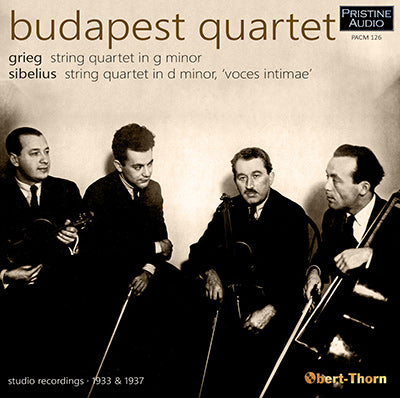
This album is included in the following sets:
This set contains the following albums:
- Producer's Note
- Full Track Listing
- Cover Art
This release is the fifth in a series which, when finished, will present the complete pre-war recordings of the Budapest Quartet. Two volumes with all of the ensemble’s earliest recordings from 1926 through 1930 have already appeared (on Pristine PACM 098 and PACM 123), followed by another featuring rarities that had previously seen scant, if any, reissues (PACM 113) and one with all of their Brahms recordings made during this period (PACM 119). The present volume features both of the Scandinavian quartets the group recorded at this time.
The Budapest Quartet was founded in 1917 by four members of the Budapest Opera Orchestra, three Hungarians and a Dutchman. By 1933, when the earliest of the recordings presented here was made, only one of the original members (Hungarian violist István Ipólyi) was still in the group, while the other three positions had been taken by Russians (actually two Lithuanians – the Schneider brothers – and the Ukrainian Roisman, all born in what was at the time part of the Russian empire). Their different training styles led to many contentious arguments within the group, which, unusually for the time, developed its interpretations by consensus, with one member designated as an authority for a particular composer to break a tie, if necessary. These disputes usually pitted Ipólyi against the three putative Russians, leading to his departure in 1936. He was replaced by the Ukrainian Boris Kroyt, who is heard in the 1937 Grieg recording presented here and who would continue with the group until it disbanded in 1967.
The behind-the-scenes drama did not carry over into the actual performances, which display a high degree of unanimity of conception and disciplined ensemble playing. Critic Harris Goldsmith likened the quartet to “a kind of chamber music equivalent to that icon of symphonic music, Arturo Toscanini”, writing that their performances “shared with the Italian maestro an easily recognizable (and then distinctly modern) technical brilliance, a certain streamlining of architecture, a pervasive rhythmic virility, unfussy phrasing and momentum [. . .] an analogous lean transparency and vertical clarity, and beautiful intensity and silkiness of tone.”
The Grieg presented here was the first complete recording of the work. When asked to compile a list of the 25 greatest string quartet recordings some years ago, writer and critic Tully Potter chose this to represent the Budapest Quartet, later citing the “romantic warmth” and “tonal quality, internal balance and homogeneity” that this “magnificent group” brought to the score.
The Sibelius was a première recording which appeared as part of the Sibelius Society albums as the only chamber work among symphonies and tone poems. It dates from the Budapest’s penultimate session in Berlin, as Hitler’s appointment as Chancellor made it increasingly untenable to keep the city as their home base. Shortly afterwards, the group made Paris their center of operations for several years until wartime conditions found them in America, where they were to stay. Along with the Bartok Second Quartet (PACM 113), it was the only 20th Century work included among their pre-war recordings.
The transfers here have been made from American Victor “Gold” label 78 rpm pressings, the earliest form of issue these recordings had in the States, employing the quietest shellac on which they were issued anywhere.
Mark Obert-Thorn
BUDAPEST QUARTET plays Grieg and Sibelius
GRIEG String Quartet in G minor, Op. 27
1. 1st Mvt. - Un poco andante - Allegro molto ed agitato (12:46)
2. 2nd Mvt. - Romanze: Andantino - Allegro agitato (8:04)
3. 3rd Mvt. - Intermezzo: Alteso molto marcato (4:25)
4. 4th Mvt. - Finale: Lento - Presto al saltarello (8:37)
Recorded 5 February 1937 in Abbey Road Studio No. 3, London
Matrix nos.: 2EA 4586/93 (all Take 1)
First issued as HMV DB 3155/8
SIBELIUS String Quartet in D minor, Op. 56, “Voces Intimae”*
5. 1st Mvt. - Andante - Allegro molto moderato (5:24)
6. 2nd Mvt. - Vivace (2:23)
7. 3rd Mvt. - Adagio di molto (9:07)
8. 4th Mvt. - Allegretto (ma pesante) (5:24)
9. 5th Mvt. - Allegro (5:05)
Recorded 8 August 1933 in the Beethovensaal, Berlin
Matrix nos.: 2D 1640-2, 1641-2, 1642-1, 1643-1, 1644-1, 1645-1, 1646-2 and 1647-2
First issued as HMV DB 2317/20
Budapest String Quartet
Joseph Roisman (violin I)
Alexander Schneider (violin II)
Boris Kroyt or *István Ipólyi (viola)
Mischa Schneider (cello)
Producer and Audio Restoration Engineer: Mark Obert-Thorn
Special thanks to Nathan Brown and Charles Niss for providing source material
Cover picture based on a photo of the Budapest Quartet (L-to-R: Roisman, A. Schneider, Ipolyi, M. Schneider) courtesy of the Tully Potter Collection
Total duration: 61:15

